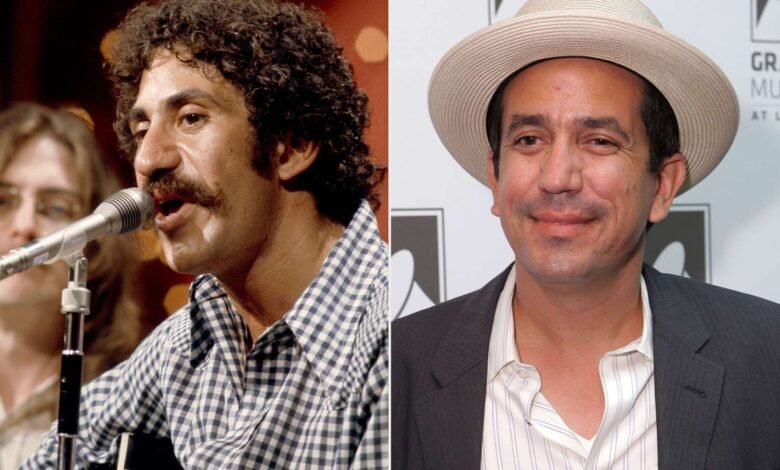Jim Croce’s Son: A.J. Croce’s Journey Through Music and Legacy

Introduction — The Legacy Continues
When people hear the name Jim Croce, they often immediately think of classics like “Time in a Bottle”, “Bad, Bad Leroy Brown”, and the heart-tugging “I’ll Have to Say I Love You in a Song.” But there’s another Croce who’s carved out his own path in the music world—A.J. Croce, Jim Croce’s only son. Though he could’ve coasted on his father’s legacy, A.J. did just the opposite: he embraced the musical inheritance, discovered his own voice, and built a career that stands on its own merits.
In this article, we’ll take a relaxed yet knowledgeable stroll through A.J.’s upbringing, musical beginnings, personal style, and the impact he’s made—from honoring his father’s memory to creating his own mark in the music world.
Upbringing and Early Influences
Growing Up in the Shadows of a Legend
A.J. Croce was born on September 28, 1971—about two years after his father tragically passed away in a plane crash in 1973. Jim Croce never got to watch his son grow up, but his music was ever-present in A.J.’s life. From the earliest days, A.J. was surrounded by his father’s records, stories, and the emotional resonance of his loss.
Many kids would have been defined by that kind of shadow, but A.J. chose to lean into it. He soaked it up like a sponge—gravitating toward music naturally, drawn to the piano, and absorbing lessons from the world around him, rather than merely resting under the weight of legacy.
Discovering Music on His Own Terms
Growing up in Pennsylvania and later California, A.J. had access to musicians and mentors who shaped his early years. He took piano lessons as a child, and as he got older, he explored a variety of styles—rock, jazz, blues, and pop. There was never a pressure to mimic his dad; instead, A.J. cultivated a curiosity about different genres and instruments, gradually piecing together his own musical identity.
In short, his upbringing was about absorbing the world—a healthy mixture of reverence for Jim’s music and personal exploration, setting him on a very distinct musical path.
Loss as Both Burden and Inspiration
While the loss of a parent that early in life is undeniably painful, it also became a profound source of inspiration. A.J. has described music, and especially his father’s songs, as a sort of portal to connection. Though he didn’t have memories of Jim directly, he learned so much through the music left behind.
In interviews, A.J. has said he felt like he could hear his father’s voice—guidance, emotional resonance—speaking to him from beyond. That influenced his approach to songwriting: honest, heartfelt, and steeped in emotional storytelling, much like Jim’s—but filtered through A.J.’s own experiences.
Finding His Musical Voice
Early Performances and First Recordings
By his late teens, A.J. had begun performing publicly. He toured in the early ’90s, gradually building a following. His debut album, A.J. Croce, came out in 1993. Produced by T-Bone Burnett, the album featured a blend of bluesy piano, rock, and heartfelt lyrics. It wasn’t a folk-rock echo of his father—it was distinctly A.J., with a grinding edge and raw emotional honesty. Critics noticed that he wasn’t just trading on legacy; he was emerging as a promising songwriter and performer in his own right.
Evolution Through the Albums
From there, A.J. released a string of albums through the 1990s and 2000s—That’s Me in the Bar, Fit to Serve, Transit, Adrian James Croce. Each record showed growth and exploration. He played with vintage aesthetics and instrumentation, sometimes nodding back to rootsy singer-songwriter traditions, at others veering into jazzy territory.
His vocals matured, and his piano playing deepened. He tackled personal themes—relationships, heartbreak, identity—and his narratives felt lived in and authentic. That’s what set him apart: you could sense someone who’d lived through real emotion, not just recited it.
A Blend of Generations
What’s fascinating is how A.J. blends reverence and innovation. He’s acknowledged his dad’s influence, performed some of Jim’s songs live, and done tribute efforts—yet those moments feel celebratory, not obligatory. He treats his father’s work with care without resting on it.
In that way, A.J. bridges generations—the ’70s singer-songwriter legacy on one side, ’90s-onward eclecticism on the other. Whether playing solo piano in intimate settings or full band rock-pop, he tailors his sound to the story he wants to tell.
Personal Style and Artistic Identity
The Piano as a Voice
Much like his father, the piano is central to A.J.’s identity as a musician—but he also treats it like a conversation piece rather than just a tool. His playing is nuanced, blues-inflected, sensitive to groove and nuance. In live shows, he often lets the piano speak emotionally, and he’s comfortable standing back while the music tells the story.
When he sings, his vocals are warm, slightly laid-back, and seasoned with life. His phrasing isn’t rushed—it leans into the emotional space of lyrics. That relaxed yet intentional delivery is a hallmark of his style.
Songwriting That Feels Personal
In the body of A.J.’s work, you’ll find themes that feel grounded in real life: family ties, reflection on loss, love’s complications, fleeting moments of joy. He doesn’t overcomplicate things with cryptic metaphors; instead, he’s honest and clarity-driven. His songs have a conversational authenticity, like he’s talking to you over a cup of coffee.
That kind of songwriting marks him as an expert storyteller—even if he says he writes by feeling rather than formula.
Live Shows and Audience Connection
On stage, A.J. comes across as genuine, approachable. He jokes, shares stories behind the songs, and when he plays one of his dad’s, people feel the weight and warmth at once. But he’s not imposingly reverent—he just locates that thread of emotional truth and lets it hum. That kind of presence doesn’t happen by accident; it comes from years of honing how to connect, perform, and tell stories that matter.
Honoring Jim While Forging His Own Path
Tribute, Not Impersonation
A.J. has participated in tributes to his dad, sometimes performing in tribute concerts or including Jim’s songs in live sets. He’s even released recordings that nod to his father’s ethos—not by replicating the sound, but by channeling the emotional core.
In interviews, he’s mentioned how meaningful it is to keep that connection alive while pushing forward. He sees the legacy as a conversation—one that he’s an active participant in, not a passive heir.
Collaborations and Solo Pursuits
A.J. has collaborated with a range of musicians—from roots and blues artists to jazzy contemporaries. He’s toured, recorded, and jammed in styles that span rock, soul, blues, and even swing. That adventurousness defines him: he’s not boxed into any one genre or audience, and that flexibility lets him explore the breadth of his musical instincts.
At the same time, he continues to release solo albums—most recently, albums that mix originals and covers, showcasing both his songwriting and his interpretive chops.
Speaking Openly About Legacy
In interviews, A.J. talks candidly about how carrying the Croce name can be both blessing and burden. But what’s striking is how lightly he carries it: yes, it matters, but he doesn’t dwell on it. Instead, he emphasizes the music, the stories, the here-and-now connection with audiences. That perspective is deeply refreshing and reflects his maturity—as performer and son.
Impact, Influence, and Looking Ahead
Cultivating a Dedicated Following
While A.J. Croce might not be a household name like his dad, he has a devoted and discerning fan base. People who discover him often stay—drawn by his rich musicianship, storytelling, and relatability. Those fans know they’ve found someone whose work rewards patience and attention.
Inspiring Other Musicians
To younger artists who look up to him, A.J. represents a model of how to honor heritage without being defined by it. He shows that you don’t need to choose between legacy and individuality—you can pursue both, if you stay honest to who you are. That stance feels quietly powerful, especially in an era where so many musicians grapple with where they come from.
What’s Next for A.J.?
Going forward, it seems A.J. will continue balancing reinterpretation with innovation. Whether through new albums, collaborations, or performances, he’s set to deepen his musical story. And while I don’t have access to his private plans, one can imagine him remaining committed to meaningful music-making—personable, emotionally resonant, and unapologetically authentic.
Conclusion — A.Croce, Not Just Croce
The story of Jim Croce’s son—A.J. Croce—isn’t one of tragic shadow or inherited stardom. It’s a story of emergence, sincerity, and evolving harmony between past and present. He grew up with the weight of legacy, but instead of shrinking, he leaned in to learn, to explore, to create.
Today, he stands not as a reminder of what was lost, but as proof of what carries on—with its own voice, its own stories, and its own warmth. For anyone curious about how you can build on a legacy without surrendering your own voice, A.J. Croce is an exemplar worth listening to



